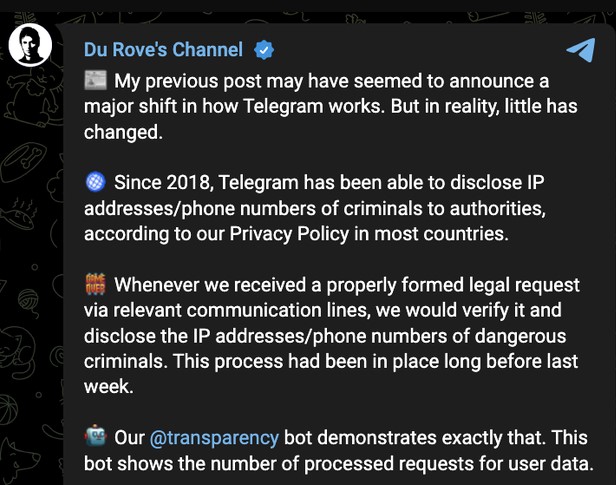Telegram has shared IP addresses, phone numbers with authorities for criminal investigations since 2018, confirms CEO
Key Takeaways
- Telegram has responded to legal data requests since 2018 as part of its privacy policy.
- Telegram’s recent updates raise concerns among users about increased surveillance and potential impacts on free speech.
Share this article
Telegram has long shared the IP addresses and phone numbers of users involved in criminal activities, CEO Pavel Durov said on his Telegram channel. He clarified that this policy has been in place since 2018 and Telegram’s recent updates to the terms of service did not introduce any major changes regarding data sharing.

Durov’s statements come as a response to concerns surrounding Telegram’s updated privacy policy, which permits the sharing of user data, including IP addresses and phone numbers, with law enforcement agencies upon receiving valid judicial requests.
The update is seen as a departure from its earlier reputation for strong user privacy. Prior to the data disclosure agreement, the platform introduced a feature allowing users to report private chats to moderators. That also marked a shift from its previous stance that private chats were protected from moderation requests.
The recent changes appear to be Telegram’s efforts to cope with ongoing legal pressure, especially when they follow the arrest of Durov in France over allegations related to the platform’s handling of illegal content.
In his first statement after the arrest, Durov acknowledged that the rapid growth of Telegram has made it easier for criminals to misuse the platform and promised changes.
Telegram’s approach now is to balance user privacy with legal compliance, ensuring that the platform does not become a haven for criminal activity.
However, users who value anonymity and privacy have expressed concerns that those updates could lead to a chilling effect on free speech. The potential for law enforcement access to user data may deter individuals from using the platform for private communications.
Share this article
